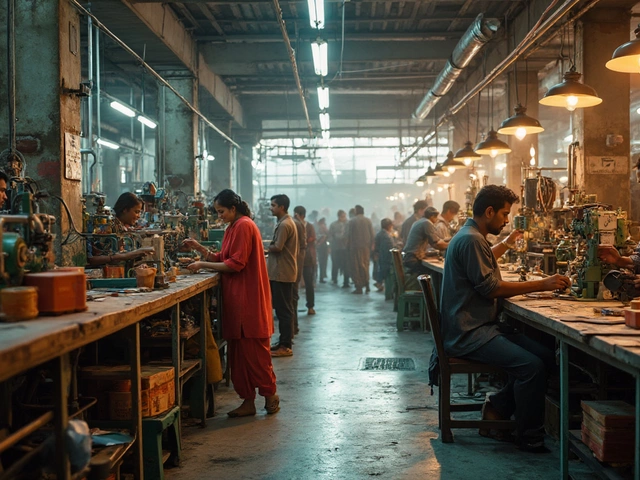Small scale manufacturing might sound like a big term, but really, it’s all about making stuff on a smaller, often more personal level. Think of that local bakery whipping up artisan bread or a family-run workshop crafting bespoke furniture. These setups operate with more limited resources compared to industrial giants, but what they lack in size, they often make up for in nimbleness and creativity.
Why should you care about small scale manufacturing? Well, for starters, it’s a hotbed for innovation. Since these businesses aren't weighed down by the bureaucracy of large corporations, they can pivot quickly, experiment with new ideas, and cater to niche markets. This agility is golden, especially in today's fast-paced market.
Interesting fact: Small scale manufacturers are significant job creators, especially in developing regions. They’ve got their fingers in many pies, from textiles to electronics. These businesses breathe life into local economies, providing employment and keeping traditional crafts alive.
- Defining Small Scale Manufacturing
- The Economic Impact
- Advantages Over Large Scale Production
- Challenges Faced
- Tips for Success
- The Future of Small Scale Manufacturing
Defining Small Scale Manufacturing
So, you've probably heard the term small scale manufacturing thrown around a bit, but what does it actually mean? At its core, it’s about producing goods on a smaller scale than the industrial giants. We're talking about businesses that typically have fewer machines, a smaller workforce, and much less capital than large manufacturers.
Small scale operations are often family-owned or operated by a small group of entrepreneurs. They can be found in all sorts of industries—everything from food production to tech gadgets. These businesses often produce goods in smaller quantities, which means they can focus on quality and uniqueness rather than sheer volume.
The Characteristics of Small Scale Manufacturing
Small scale manufacturing has some distinct characteristics that set it apart:
- Lower Investment: Start-ups in this space don't require the massive funding that large factories do. An investment of a few thousand dollars can sometimes be enough to get things rolling.
- Flexibility: These businesses can adapt quickly to changes in market demand and aren't as bogged down by bureaucratic processes.
- Focus on Niche Markets: Because they don't have to produce in bulk, they can afford to cater to specific customer needs or preferences.
Examples of Small Scale Manufacturing
Let's put this into perspective with some real-world examples. Picture a workshop in your town that makes custom wooden toys. They don’t have a monstrous factory, but they're producing in small batches and selling directly to consumers or in local craft markets. That's small scale manufacturing in action.
Another classic example is a craft brewery. They might not be churning out the same volume as a major beer company, but they’re experimenting with flavors and catering to local tastes, providing something new and fresh to their community.
Impact and Importance
Beyond just churning out goods, small scale manufacturing businesses are crucial in different ways. They’re known for supporting local economies by providing jobs and doing business with other local suppliers. Plus, they often help preserve traditional skills and crafts that might otherwise fade away.
The Economic Impact
Small scale manufacturing is more than just a trend—it's a critical part of our economy. Let's look at why this sector plays such a big role.
Firstly, businesses engaged in small scale manufacturing often drive job creation. It's a powerhouse for employment, especially in regions where large-scale industries aren't prevalent. These businesses are typically labor-intensive and can offer employment opportunities to a wide range of skill levels. For many, this means a chance to step into the workforce and gain valuable experience.
Secondly, local production can significantly reduce costs associated with imports and exports. By keeping creation closer to consumers, money spent on transportation and tariffs can be minimized. This efficient economic cycle boosts local economies and often encourages community involvement and investment.
Here's an interesting stat: According to recent studies, small scale manufacturers contribute significantly to GDP in many countries. In the UK, they represent over 30% of the manufacturing sector. That's not a small number!
Encouraging Innovation
Small scale operations are usually at the forefront of innovation. Since they're not bound by the same constraints as large corporations, they can innovate rapidly. This progress isn't just good for the businesses; it impacts the entire sector by pushing boundaries and setting new standards.
Supporting Sustainability
Another upside is their potential for sustainable practices. Since small scale manufacturing businesses are often more aware of their immediate environment, many adopt eco-friendly processes more readily than larger, more cumbersome operations. This focus on sustainability not only caters to increasingly conscious consumers but also ensures that these businesses can adapt to regulatory changes smoothly.
The takeaway? The economic impact of small scale manufacturing goes well beyond just making money. It's about empowering communities, supporting sustainable practices, and fostering a culture of innovation. And in doing so, these businesses carve out a significant spot in our economy.
Advantages Over Large Scale Production
When you think about small scale manufacturing, some clear perks pop up compared to huge industrial setups. One of the big winners is flexibility. These smaller operations can adapt quickly to customer demand or tweak their products without facing the red tape that often stifles larger companies.
Personal Touch
There's something special about getting a product that feels unique, right? Small scale manufacturers often cater to niche markets, offering personalized or unique items that you just can't find on the high street. This personalized approach helps them cultivate a loyal customer base.
Cost Efficiency
Operating on a smaller scale means they aren't spending massive amounts on machinery or infrastructure. Instead, they can focus on making their processes lean and mean, cutting costs where it matters, and making sure every penny counts.
Small scale manufacturing also often relies on local suppliers, reducing transportation costs and bolstering local economies. This can be a big plus for community development.
Quick to Innovate
With fewer layers of management, decision-making is often quicker in small businesses. This agility allows them to innovate faster and bring fresh ideas to market in a jiffy.
"Small businesses are the backbone of our economy; they bring so much value through innovation and diversity." — British Small Business Federation
Environmental Benefits
You'll often find that small scale manufacturers use sustainable practices and resources. They tend to have a smaller carbon footprint compared to big factories that might not prioritize eco-friendly practices. Supporting these businesses can mean supporting greener choices.
Sometimes, small manufacturers focus on recycling and using eco-friendly materials, showing that being small can still make a big difference.

Challenges Faced
Small scale manufacturing comes with its fair share of hurdles. One of the main issues is limited access to capital. Unlike larger corporations, these smaller setups often struggle to secure loans or investments to grow their business. The bank isn’t always keen on extending a line of credit to ventures that lack significant collateral. Moreover, even if funding is acquired, interest rates can be steep – a banana skin for many budding entrepreneurs.
Another challenge is maintaining a steady supply chain. Small scale manufacturers frequently deal with smaller orders, making it tough to get the best prices or priority from suppliers. It’s a classic case of the smaller fish sometimes getting overlooked in favor of bigger catches.
Manpower is another biggie. These businesses often operate with limited staff, which means each team member needs to wear multiple hats. This can lead to burnout and impact overall productivity. Training and retaining skilled workers become essential but challenging tasks.
Dealing with Competition
In the world of production, competition is fierce, especially when small scale operations are up against large manufacturers who can afford to slash prices and flood the market. Standing out requires niche products, superior quality, or exceptional customer service.
Staying Tech-Savvy
Technology adoption is crucial but also a stumbling block. Keeping up with the latest tech can be costly and sometimes overwhelming for smaller teams. However, embracing affordable tech upgrades can often provide a competitive edge. A smart investment here and there can streamline operations and boost efficiency.
| Challenge | Solution |
|---|---|
| Access to Capital | Explore crowdfunding options or microloans |
| Supply Chain Issues | Build strong supplier relationships |
| Manpower Shortages | Offer flexible working conditions to attract talent |
| Competition | Focus on niche markets |
| Technology | Consider investing in open-source solutions |
Small scale manufacturing isn't a walk in the park, but with the right strategies, these challenges can be tackled head-on. The key is to stay agile, keep learning, and never shy away from innovation.
Tips for Success
Navigating the waters of small scale manufacturing can be tricky, but it’s not impossible. Here’s the lowdown on how you can turn your small production venture into a success story.
1. Identify Your Niche
In the world of small scale manufacturing, being a Jack-of-all-trades isn't your best bet. Instead, hone in on a niche where you can really stand out. Maybe it's eco-friendly packaging or custom handmade jewelry—whatever it is, make sure it's something you’re passionate about and fills a market gap.
2. Focus on Quality Over Quantity
Your advantage over large manufacturers is your ability to produce high-quality products. By offering something unique and well-made, you create a loyal customer base and encourage word-of-mouth recommendations. Remember, one disgruntled customer can do more harm than a dozen happy ones!
3. Streamline Your Processes
Efficiency is key. Invest in affordable technology like simple automation tools to reduce manual tasks. Even basic software for inventory management can save you heaps of time. The less time you spend on repetitive tasks, the more you can focus on growing your business.
4. Build a Strong Online Presence
Your business should be just as visible online as it is offline. A user-friendly website combined with active social media profiles can help you expand your reach. While at it, consider platforms like Etsy or Amazon for additional exposure, especially if you're in the crafts or homemade goods sector.
5. Utilize Local Resources
Don’t underestimate the power of local suppliers and networks. They can offer competitive pricing on raw materials and might lead you to potential partnerships or collaborations. Plus, supporting your community often brings goodwill and reinforces your brand’s presence locally.
- Networking: Join local business groups or chambers of commerce.
- Workshops: Attend industry events to pick up new skills and insights.
6. Keep an Eye on Trends
Industries evolve constantly, and keeping an ear to the ground can inform your business decisions. Whether it’s a new production method or changing consumer preferences towards sustainability, staying updated helps in adapting swiftly.
| Trend | Impact |
|---|---|
| Eco-Friendly Production | Increased demand for sustainable products |
| Digital Sales Channels | More reach and potential customers |
With these tips, you’re better equipped to take charge of your small scale manufacturing business and steer it towards success. It’s not just about having an excellent product but also about making smart, informed decisions along the way.
The Future of Small Scale Manufacturing
The future of small scale manufacturing is looking bright, with technology playing a huge role. Think about how 3D printing, or additive manufacturing, is changing the game. It allows for customized products with no need for huge production runs. This tech is perfect for smaller businesses that need to stay flexible and cost-effective.
Another buzzword? Sustainability. Consumers are more eco-conscious than ever, and small scale manufacturers can adapt quickly to use sustainable practices. Local sourcing and eco-friendly materials are not just trends; they're becoming essential for staying relevant.
Tech Revolution
There's more tech on the horizon. Automation and AI are helping even the smallest manufacturers streamline processes, reduce errors, and increase productivity. Yes, robots and intelligent systems aren't just for large industries anymore — they’re getting really affordable and accessible.
Focus on Local Markets
Moreover, there's a rising trend towards supporting local businesses. With transport costs and global supply chain issues getting more attention, small producers have a real chance to shine. They can offer personalized service and quality that bigger players may struggle to match.
Challenges and Opportunities
Of course, it’s not all sunshine. Staying competitive means tackling challenges like finding the right talent and keeping up with rapidly changing tech. But those who can navigate these hurdles will find plenty of opportunities.
Let’s break it down in numbers:
| Year | Percentage of Small Manufacturing Businesses Using AI/Automation |
|---|---|
| 2023 | 15% |
| 2024 | 22% |
| 2025 (Projected) | 30% |
As you see, adopting new technology is increasing. With more access to resources than ever, now’s the time for small manufacturers to grab those opportunities and lead the way.





